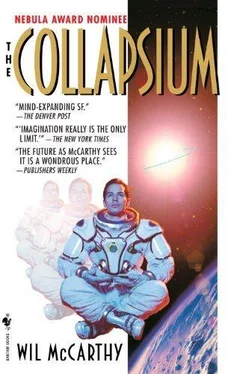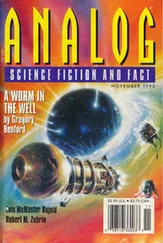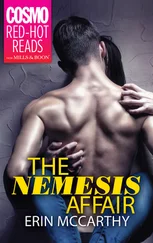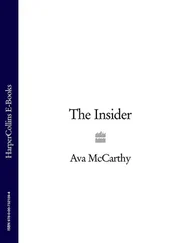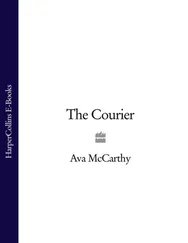Wil McCarthy - The Collapsium
Здесь есть возможность читать онлайн «Wil McCarthy - The Collapsium» весь текст электронной книги совершенно бесплатно (целиком полную версию без сокращений). В некоторых случаях можно слушать аудио, скачать через торрент в формате fb2 и присутствует краткое содержание. Город: New York, Год выпуска: 2000, ISBN: 2000, Издательство: Del Rey/Ballantine, Жанр: Фантастика и фэнтези, на английском языке. Описание произведения, (предисловие) а так же отзывы посетителей доступны на портале библиотеки ЛибКат.
- Название:The Collapsium
- Автор:
- Издательство:Del Rey/Ballantine
- Жанр:
- Год:2000
- Город:New York
- ISBN:0-345-40856-X
- Рейтинг книги:3 / 5. Голосов: 1
-
Избранное:Добавить в избранное
- Отзывы:
-
Ваша оценка:
- 60
- 1
- 2
- 3
- 4
- 5
The Collapsium: краткое содержание, описание и аннотация
Предлагаем к чтению аннотацию, описание, краткое содержание или предисловие (зависит от того, что написал сам автор книги «The Collapsium»). Если вы не нашли необходимую информацию о книге — напишите в комментариях, мы постараемся отыскать её.
The Collapsium — читать онлайн бесплатно полную книгу (весь текст) целиком
Ниже представлен текст книги, разбитый по страницам. Система сохранения места последней прочитанной страницы, позволяет с удобством читать онлайн бесплатно книгу «The Collapsium», без необходимости каждый раз заново искать на чём Вы остановились. Поставьте закладку, и сможете в любой момент перейти на страницу, на которой закончили чтение.
Интервал:
Закладка:
The Collapsium
by Wil McCarthy
for Quentin and Casey, because I said so
BOOK ONE
Once Upon a Matter Crushed
Chapter One
in which an important experiment is disrupted
In the eighth decade of the Queendom of Sol, on a miniature planet in the middle depths of the Kuiper Belt, there lived a man named Bruno de Towaji who, at the time of our earliest attention, was beginning his 3088th morning walk around the world.
The word “morning” is used advisedly here, since along the way he walked through the day and night and back again without pausing to rest. It was a very small planet, barely six hundred meters across, circled by an even tinier “sun” and “moon” of Bruno’s own design.
Walk with him: see his footpath cutting through the blossomy meadow, feel the itch of pollens in your eyes and nose. Now pass through into the midday forest, with its shafts of sunlight filtering warmly through the canopy. The trees are low and wide, citrus and honeysuckle and dogwood, not so much a shady, mushroom-haunted wilderness as a compromise with physical law—taller trees would reach right out of the troposphere. As it is, the highest limbs brush and break apart the puffy summer clouds that happen by.
Pass the Northern Hills; watch the stream trickle out between them; see the forest give way to willows at its bank. The bridge is a quaint little arch of native wood; on the far side lie the grasslands of afternoon, the vegetable gardens tended by stoop-backed robots, the fields of wild barley and maize tended by no one, lit by slantwise rays. Behind you, the sun dips low, then slips behind the planet’s sharply curved horizon. Despite the refraction of atmospheric hazes, darkness is sudden, and with it the terrain grows rocky—not jagged but hard and flat and boulder-strewn, dotted with hardy Mediterranean weeds. But here the stream winds back again, and as evening fades to night the channel of it widens out into cattail marshland and feeds, finally, into a little freshwater sea. Sometimes the moon is out, drawing long white reflections across the silent water, but tonight it’s only the stars and the Milky Way haze and the distant, pinpoint gleam of Sol. All of history is down there; if you like, you can cover the human race with your hand.
It grows colder; realize the planet shields you from the little sun—the only local heat source—with the deadly chill of outer space so close you could literally throw a rock into it. But the beach leads around to twilight meadows, and the horizon ruddies up with scattered light, and then suddenly it’s morning again, the sun breaking warmly above the planet’s round edge. And there is Bruno’s house: low, flat, gleaming marble-white and morning-yellow. You’ve walked a little over two kilometers.
Such was Bruno’s morning constitutional, very much like all his others. Sometimes he’d fetch a coat and take the other route, over the hills, over the poles, through cold and dark and cold and hot, but that was mainly a masochism thing; the polar route was actually shorter, and a good deal less scenic.
He’d already eaten breakfast; the walk was to aid his digestion, to invigorate his mind for the needs of the day: his experiments. The front door opened for him. Inside, robot servants stepped gracefully out of his way, providing a clear path to the study, bowing as he passed, though he’d told them a thousand times not to. He grumbled at them wordlessly as he passed. They didn’t reply, of course, though their bronze and tin-gray manikin bodies hummed and clicked with faint life. Mechanical, unburdened by imagination or want, they were utterly dedicated to his comfort, his satisfaction.
Another door opened for him, closed behind him, vanished. He waved a hand, and the windows became walls. Waved another, and the ceiling lights vanished, the floor lights vanished, the desk and chairs and other furnishings became optical superconductors: invisible. Projective holography created the illusion of his day’s apparatus: fifty collapsons, tiny perfect cubes visible as pinpoints of Cerenkov light, powder-blue and pulsing faintly, circling the holographic planet in a complex dance of swapping orbits.
He’d spent the past week assembling these, after his last batch had gone sour.
Assembling them? Certainly.
Imagine a sphere of di-clad neutronium, shiny with Compton-scattered light. It’s a sort of very large atomic nucleus; a billion tons of normal matter crushed down to a diameter of three centimeters so that the protons and electrons that comprise it are bonded together into a thick neutron paste. Left to itself it would, within nanoseconds, explode back into a billion tons of protons and electrons, this time with considerable outward momentum. Hence the cladding: crystalline diamond and fibrediamond and then crystalline again, with a bound layer of wellstone on top. Tough stuff indeed; breaking the neutrons free of their little jail was difficult enough that Bruno had never heard of its happening by accident.
These “neubles” were the seeds of seeds—it took eight of them, crushed unimaginably farther, to build a collapson— and the little “moon” was actually just Bruno’s storage bin: ten thousand neubles held together by their own considerable gravity. Another fifteen hundred formed the core of the tiny planet, a sphere about half a meter across, with a skeleton of wellstone built on top of it, fleshed out with a few hundred meters of dirt and rock and an upper layer neatly sculpted by robots and artisans.
Bruno was very wealthy, you see.
But instead of moons and planets, one could also make black holes of these things, black holes held rigidly into stable lattices, a phase of matter known as “collapsium.” [1] See Appendix A: Collapsium, page 361
Bruno had been the first to do this, and was still doing it these seventy years later. He’d traded his soul for it, in some sense. Traded a whole phase of his life, anyway: his love, his adopted home on Tongatapu. But what a thing to swap them for: the bending and twisting of spacetime to his personal whims. The potential of it…
That was the exciting part, and in truth, he’d be happy enough to direct the enterprise, leaving the gruntwork to a horde of employees or devoted grad students or something. The biggest problem was that almost no one was patient enough to work the equations, even to deduce which structures were stable and which were not, much less to derive the properties of the stable ones from first principles. The work was hard , and there were very few graduates to be had for it. That was the biggest problem. The second biggest was the sort of accidents you got when collapsium experiments went awry, and the third biggest problem was the twenty billion people who got understandably upset when this occurred.
So of the handful of people competent to perform the research, most stuck contentedly to the safer paths, the trodden paths, the paths on which accidents were far rarer than fame and fortune. Plodders, he sometimes called them.
He settled down in his invisible chair, feeling it subtly reshape itself beneath him. Not soft but smart , a solid thing that yielded only for him. He cracked his knuckles, flexed his shoulders, jiggled his wrists like an old-fashioned strongman preparing to lift something heavy. He did these things slowly; an observer might almost have said grimly . It didn’t matter that the actual lifting was done by electromagnetic grapples; he would submerge himself in that same mental space where athletes go, where the body obeys the mind, where stiffness and pain and time are reluctant to penetrate. On your marks…
Bruno had tried to be one of the plodders, he really had. He’d spent years making his telecom collapsiters faster and better and cheaper, building the Iscog, building his fortune. But all that was boring compared to what he really wanted, which was to build an arc defin capable of snatching photons from the end of time itself. Time had an end—the state equations made that clear enough—but what sort of end was the subject of endless noise and conjecture. And why grumble and theorize when you could just open up a window and see the whole business with your own two eyes?
Читать дальшеИнтервал:
Закладка:
Похожие книги на «The Collapsium»
Представляем Вашему вниманию похожие книги на «The Collapsium» списком для выбора. Мы отобрали схожую по названию и смыслу литературу в надежде предоставить читателям больше вариантов отыскать новые, интересные, ещё непрочитанные произведения.
Обсуждение, отзывы о книге «The Collapsium» и просто собственные мнения читателей. Оставьте ваши комментарии, напишите, что Вы думаете о произведении, его смысле или главных героях. Укажите что конкретно понравилось, а что нет, и почему Вы так считаете.
